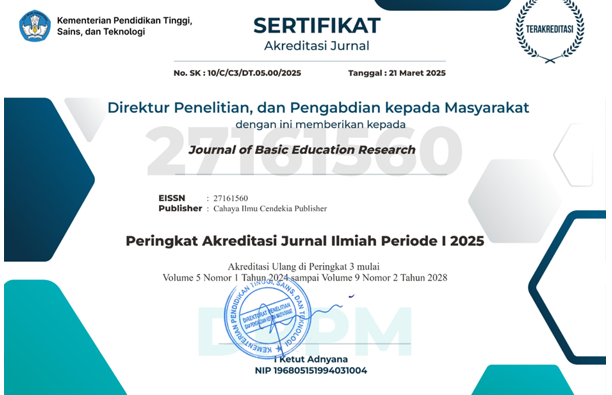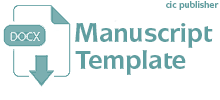Effectiveness of Literacy Program in Primary Education
Abstract
Purpose of the study: This study aims to evaluate the effectiveness of the School Literacy Movement (GLS) in shaping students' reading habits and literacy culture in primary education, particularly in rural elementary schools.
Methodology: A qualitative evaluation approach was used, adopting the Kaufman five-level evaluation model. Data were gathered through observation, structured interviews, and documentation across six elementary schools in the Sudirman cluster, Wonogiri District, using triangulation and interactive data analysis.
Main Findings: The study finds that the effectiveness of GLS implementation is closely linked to leadership commitment, teacher involvement, student participation, and documentation systems. Schools with structured routines, contextual innovation, and community support show stronger outcomes in reading habits, student expression, and collaborative literacy culture.
Novelty/Originality of this study: This study uniquely applies Kaufman's evaluation model in a rural education setting, capturing not only program performance but also the integration of literacy into school routines and culture. It presents a contextualized analysis of GLS, offering a practical framework for policy refinement and school-based literacy development.
References
G. W. Bayu, N. N. Padmadewi, I. Sudiana, and I. B. Putrayasa, “21st-century skill-based literacy learning guide for elementary schools,” Multidiscip. Sci. J., 2023, doi: 10.31893/multiscience.2023068.
F. Nurdianingsih, R. R. Rozak, I. I. T. Rohmah, and T. R. Izza, “Fun english class as an effort to improve english literacy for children at elementary level,” Zabags Int. J. Engagem., 2024, doi: 10.61233/zijen.v2i1.13.
Kementerian Pendidikan, “Peraturan menteri pendidikan dan kebudayaan republik indonesia nomor 23 tahun 2015 tentang penumbuhan budi pekerti.” Kementerian Pendidikan dan Kebudayaan RI, 2015. [Online]. Available: https://peraturan.bpk.go.id/Home/Details/135236/permendikbud-no-23-tahun-2015
OECD, PISA 2022 Results: What Students Know and Can Do. OECD Publishing, 2024.
T. E. Toprak-Yildiz, “An international comparison using cognitive diagnostic assessment: fourth graders’ diagnostic profile of reading skills on PIRLS 2016,” Stud. Educ. Eval., vol. 70, p. 101057, 2021, doi: 10.1016/J.STUEDUC.2021.101057.
Y. P. Pratiwi, N. E. Rusminto, and R. Perdana, “Pirls-based cognitive assessment instrument: How effective is it for measuring Indonesian language reading literacy in fifth grade?,” Int. J. Educ. Stud. Soc. Sci., 2022, doi: 10.53402/ijesss.v2i3.80.
J. C. Frijters, C. D. Barr, and C. E. Snow, “Early predictors of reading comprehension growth: The role of motivation and engagement,” Read. Writ., vol. 33, no. 5, pp. 1215–1238, 2020, doi: 10.1007/s11145-019-09996-6.
Y.-T. Sung, K.-E. Chang, and T.-C. Liu, “Literacy promotion across communities: The importance of systemic efforts,” Educ. Res. Rev., vol. 37, p. 100493, 2022, doi: 10.1016/j.edurev.2022.100493.
Y.-S. G. Kim, H. Boyle, S. S. Zuilkowski, and P. Nakamura, “Landscape report on early grade literacy.” UNESCO, 2017. [Online]. Available: https://unesdoc.unesco.org/ark:/48223/pf0000253477
B. Piper, Y. Sitabkhan, J. Mejia, and K. Betts, “Effectiveness of teachers’ guides in the Global South: Scripting, learning outcomes, and classroom practice,” RTI Press, 2018. doi: 10.3768/rtipress.2018.op.0053.1809.
E. J. Pretorius and N. Spaull, “Exploring relationships between oral reading fluency and reading comprehension among English Second Language readers in South Africa,” Read. Writ., vol. 29, pp. 1449–1471, 2016, doi: 10.1007/s11145-016-9645-9.
R. Mahmudah, “Pelaksanaan GLS di sekolah dasar negeri di pedesaan: studi evaluatif,” EduHumaniora, vol. 14, no. 2, pp. 89–100, 2022.
F. Wijayanti, D. Rachmawati, and A. Azis, “Evaluasi Program Literasi Sekolah Dasar Berbasis CIPP Model,” J. Pendidik. Dasar, vol. 12, no. 1, pp. 45–56, 2021.
J. W. Creswell, “Research design: Qualitative, quantitative, and mixed methods approaches-4th ed,” SAGE Publ., vol. 86(385), 2013.
A. W. Frye and P. A. Hemmer, “Program evaluation models and related theories: AMEE Guide No. 67,” Med. Teach., vol. 34, no. 5, pp. e288–e299, 2012, doi: 10.3109/0142159X.2012.668637.
R. Kaufman and I. Guerra, Planning, Implementing, and Evaluating Educational Programs: A Handbook for Practitioners. Lanham, MD: Routledge, 2013.
Sugiyono, Metode Penelitian Kuantitatif, Kualitatif dan R&D. Alfabeta, 2019.
K. K. Y. Ma, A. Burn, and J. K. Anderson, “Review: School-based mental health literacy interventions to promote help-seeking - a systematic review.,” Child Adolesc. Ment. Health, 2022, doi: 10.1111/camh.12609.
R. Nash, K. Patterson, A. Flittner, S. L. Elmer, and R. Osborne, “School-Based Health Literacy Programs for Children (2-16 Years): An International Review.,” J. Sch. Health, 2021, doi: 10.1111/josh.13054.
A. Parsons, S. A. Parsons, A. L. Morewood, and J. W. Ankrum, “Barriers to Change: Findings From Three Literacy Professional Learning Initiatives,” Lit. Res. Instr., vol. 55, pp. 331–352, 2016, doi: 10.1080/19388071.2016.1193575.
C. Ceobanu and M. Zerbib, “Embedding Innovation: How School-Based Research and Development Teams, Can Systematically Cultivate 21st Century Learning Ecosystem,” Educ. 21, 2024, doi: 10.24193/ed21.2024.28.01.
H. Halimah, D. N. Ningsih, S. S. Rahmawati, E. Patimah, and F. P. Aulia, “Student innovation in campus teaching: a program to improve elementary school student literacy,” J. Inov. Pendidik. Dan Pembelajaran Sekol. Dasar, 2024, doi: 10.24036/jippsd.v8i2.128460.
K. A. Leech, S. McNally, M. Daly, and K. Corriveau, “Unique effects of book-reading at 9-months on vocabulary development at 36-months: Insights from a nationally representative sample of Irish families,” Early Child. Res. Q., 2022, doi: 10.1016/j.ecresq.2021.09.009.
I. Boerma, S. E. Mol, and J. Jolles, “The role of home literacy environment, mentalizing, expressive verbal ability, and print exposure in third and fourth graders’ reading comprehension,” Sci. Stud. Read., vol. 21, pp. 179–193, 2017, doi: 10.1080/10888438.2016.1277727.
J. S. Kim, J. Relyea, M. A. Burkhauser, E. Scherer, and P. Rich, “Improving elementary grade students’ science and social studies vocabulary knowledge depth, reading comprehension, and argumentative writing: a conceptual replication,” Educ. Psychol. Rev., vol. 33, pp. 1935–1964, 2021, doi: 10.1007/s10648-021-09609-6.
C. Piper and S. Wilairat, “Graduate library student interest in health sciences graduate employment positions: A think aloud study,” J. Acad. Librariansh., vol. 48, no. 6, p. 102600, Nov. 2022, doi: 10.1016/j.acalib.2022.102600.
J. Amels, M. Krüger, C. Suhre, and K. van Veen, “The effects of distributed leadership and inquiry-based work on primary teachers’ capacity to change: testing a model,” Sch. Eff. Sch. Improv., vol. 31, pp. 468–485, 2020, doi: 10.1080/09243453.2020.1746363.
J. Mathieu, M. R. Kukenberger, L. D’Innocenzo, and G. Reilly, “Modeling reciprocal team cohesion-performance relationships, as impacted by shared leadership and members’ competence.,” J. Appl. Psychol., vol. 100 3, pp. 713–34, 2015, doi: 10.1037/a0038898.
A. Muniandy and K. Musa, “Concepts and practices of distributive leadership in malaysian schools,” Int. J. Educ. Psychol. Couns., 2024, doi: 10.35631/ijepc.955015.
Z. A. T. Philippakos, R. Ross, and J. Summers, “Promoting ongoing partnerships in family literacy through yearlong collaborations,” Early Child. Educ. J., vol. 51, pp. 1499–1510, 2022, doi: 10.1007/s10643-022-01404-4.
S. Z. Aidalkilani, “The role of home-school-community partnership in promoting reading,” Dirasat Hum. Soc. Sci., vol. 49, no. 3, 2022, doi: 10.35516/hum.v49i3.1359.
R. Kaufman and I. Guerra, Planning, Implementing, and Evaluating Educational Programs: A Handbook for Practitioners. Lanham, MD: Routledge, 2013.
B. Basuki and N. Anriani, “Evaluation of accounting learning models: implementation of context, input, process, and product (CIPP) evaluation on problem-based learning models,” Edunesia J. Ilm. Pendidik., vol. 4, no. 2, pp. 711–721, 2023, doi: 10.51276/edu.v4i2.334.
I. K. Darma, “The effectiveness of teaching program of CIPP evaluation model,” Int. Res. J. Eng. IT Sci. Res., vol. 5, no. 3, pp. 1–13, Apr. 2019, doi: 10.21744/irjeis.v5n3.619.
Copyright (c) 2025 Windya Retno Ariyani, Sri Marmoah, Winarno Winarno

This work is licensed under a Creative Commons Attribution 4.0 International License.
Authors who publish with this journal agree to the following terms:
- Authors retain copyright and acknowledge that the Journal of Basic Education Research is the first publisher licensed under a Creative Commons Attribution 4.0 International License.
- Authors are able to enter into separate, additional contractual arrangements for the non-exclusive distribution of the journal's published version of the work (e.g., post it to an institutional repository or publish it in a book), with an acknowledgment of its initial publication in this journal.
- Authors are permitted and encouraged to post their work online (e.g., in institutional repositories or on their website) prior to and during the submission process, as it can lead to productive exchanges and earlier and greater citation of published work.





.png)


.png)
.png)


















